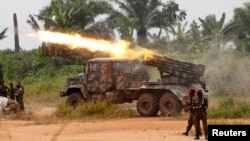Attacks on civilians in the Beni region of the Democratic Republic of the Congo have killed at least 550 people in the past 18 months. Congolese officials have placed the blame on the Allied Democratic Forces, characterized as a Ugandan Islamist movement, but a report from the Congo Research Group says it may not be that simple.
Jason Stearns, lead author of the report, agreed that the ADF was partly responsible but said the group was not working alone.
“The first conclusion [is] that the ADF is not really what people make it out to be," he said. "It’s not this foreign Islamist force; it’s a force that is much more rooted in local society. And the second conclusion is that it’s not just the ADF but also others who are involved in the massacres.”
Researchers spent six months interviewing more than 100 people, including survivors of the attacks.
The report cites various sources who accuse local militias and members of the Congolese military. It says it's alleged that in some cases, men were promised up to $250 for each person they killed.
As to who might have been paying them and why, Stearns said his group was still working on that and had reached no conclusions.
Arrests for inaction
The authorities have arrested some individuals in the military for failing to take action against the ADF, but not specifically for involvement in the massacres, Stearns said.
“Since the beginning of the massacres, there have been a few, I would say, very few arrests of individuals, mostly for inaction rather than complicity," he said. "I do not believe any of them have been found guilty or that their trials have gone through to their conclusion.”
Local human rights groups suspect there may have been high-level complicity. Lewis Saliboko, an activist in Oicha, near Beni, said authorities couldn't say that all the crimes were the work of the ADF alone. There was a sort of complicity, he alleged, because the ADF was able to operate with impunity.
Saliboko and other local people said the killings sometimes happened close to military camps, but that soldiers ignored pleas to intervene and the killers walked away.
Since mid-2015, the Congolese army has taken a more aggressive stance, and there has been increased fighting between soldiers and armed groups sometimes described as "presumed ADF."
A leader of civil society groups in the territory, Teddy Kataliko, said a thorough investigation was needed. He said the groups were calling on the Congolese government to go beyond the military approach and create a strong intelligence service so that the killers’ networks could be dismantled and those collaborating with them brought to justice.




